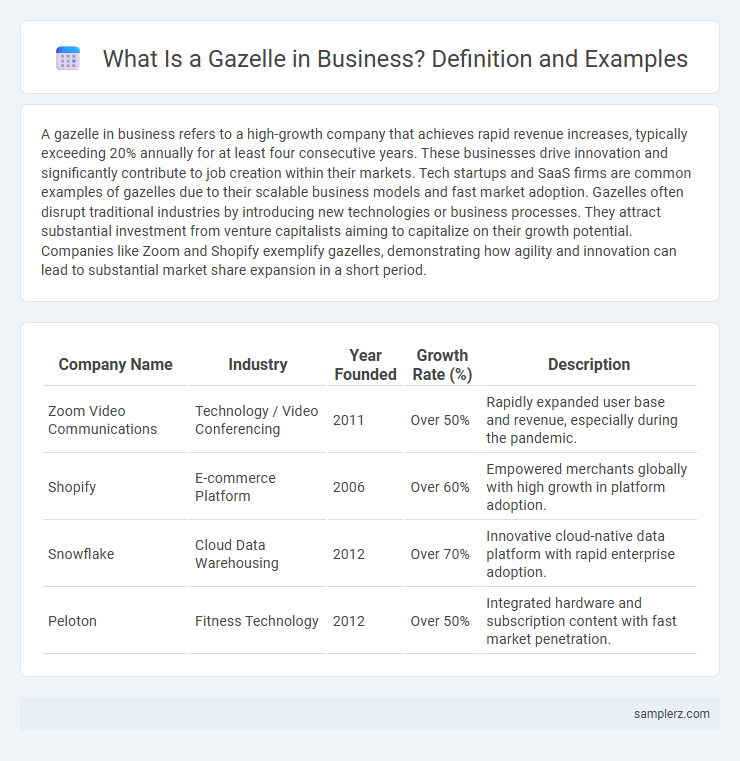A gazelle in business refers to a high-growth company that achieves rapid revenue increases, typically exceeding 20% annually for at least four consecutive years. These businesses drive innovation and significantly contribute to job creation within their markets. Tech startups and SaaS firms are common examples of gazelles due to their scalable business models and fast market adoption. Gazelles often disrupt traditional industries by introducing new technologies or business processes. They attract substantial investment from venture capitalists aiming to capitalize on their growth potential. Companies like Zoom and Shopify exemplify gazelles, demonstrating how agility and innovation can lead to substantial market share expansion in a short period.
Table of Comparison
| Company Name | Industry | Year Founded | Growth Rate (%) | Description |
|---|---|---|---|---|
| Zoom Video Communications | Technology / Video Conferencing | 2011 | Over 50% | Rapidly expanded user base and revenue, especially during the pandemic. |
| Shopify | E-commerce Platform | 2006 | Over 60% | Empowered merchants globally with high growth in platform adoption. |
| Snowflake | Cloud Data Warehousing | 2012 | Over 70% | Innovative cloud-native data platform with rapid enterprise adoption. |
| Peloton | Fitness Technology | 2012 | Over 50% | Integrated hardware and subscription content with fast market penetration. |
Defining Gazelle Companies in Business
Gazelle companies in business are high-growth firms that achieve annual revenue growth exceeding 20% over a period of at least four years, often doubling their size rapidly in competitive markets. These agile businesses excel in scalability, innovation, and market responsiveness, distinguishing themselves from slower-growing firms. They significantly contribute to job creation and economic development by driving rapid expansion and sustaining long-term competitive advantage.
Key Characteristics of Business Gazelles
Business gazelles are companies that achieve rapid growth, typically expanding revenue by at least 20% annually over four years while maintaining a small or medium size. Key characteristics include innovative products or services, scalable business models, and a strong market demand that supports sustained accelerated expansion. These companies often operate in dynamic markets and leverage agility and adaptability to outpace competitors quickly.
Notable Examples of Gazelle Companies
Notable examples of gazelle companies include Zoom Video Communications, which achieved rapid revenue growth by capitalizing on virtual meeting demands, and Shopify, known for its exponential expansion in e-commerce solutions. Palantir Technologies also exemplifies a gazelle through its swift market penetration and innovative data analytics platforms. These companies showcase how scalable business models and technological innovation drive exceptional growth rates.
Gazelle Companies vs. Unicorn Startups
Gazelle companies are high-growth businesses that rapidly increase revenue by 20% or more annually, often doubling their size within four years, with a strong focus on sustainable scaling and profitability. In contrast, unicorn startups are privately-held companies valued at over $1 billion, typically emphasizing aggressive market disruption and rapid valuation growth over immediate profitability. While gazelles drive steady economic expansion through consistent job creation, unicorns attract significant venture capital and aim for large market dominance, reflecting different strategic priorities in business growth trajectories.
How Gazelles Drive Economic Growth
Gazelle companies, characterized by rapid revenue growth exceeding 20% annually, drive economic growth by creating a disproportionate share of new jobs and innovation. These high-growth startups contribute significantly to GDP by disrupting established markets and attracting investment. Their agility and ability to scale quickly make them vital engines of economic renewal and competitiveness.
Success Factors for Gazelle Businesses
Gazelle businesses, characterized by rapid revenue growth exceeding 20% annually, thrive through innovation, scalable business models, and strong customer focus. Access to capital and a talented management team drive their ability to adapt quickly and sustain aggressive expansion. Market agility combined with efficient operational execution underpins their competitive advantage and long-term success.
Challenges Faced by Gazelle Companies
Gazelle companies, characterized by rapid revenue growth exceeding 20% annually, often face challenges such as scaling operations without compromising quality and managing cash flow constraints amid accelerated expansion. These businesses struggle with maintaining a skilled workforce while adapting to evolving market demands and intense competitive pressures. Navigating regulatory complexities and sustaining innovation are critical to avoiding stagnation or decline after the initial growth surge.
Case Study: Famous Gazelle Organizations
Amazon exemplifies a gazelle company by consistently achieving rapid revenue growth exceeding 20% annually while expanding its market presence worldwide. Spotify, another renowned gazelle, disrupted the music industry through innovative streaming services, rapidly scaling user adoption and revenue within a few years. Dropbox demonstrates how a gazelle leverages cloud technology to swiftly grow its customer base and secure significant venture capital funding, fueling continuous expansion.
Supporting the Growth of Gazelle Startups
Gazelle startups, characterized by rapid revenue growth of over 20% annually, require targeted support such as access to venture capital, mentorship, and scalable technology infrastructure to sustain their expansion. Organizations like the Small Business Administration (SBA) and specialized accelerator programs provide essential resources that address the unique challenges faced by these high-growth companies. Establishing strong networks with industry experts and fostering adaptive business models significantly contribute to the successful scaling of gazelle startups.
Lessons Learned from Gazelle Business Success Stories
Gazelle companies demonstrate rapid growth by prioritizing scalable business models, customer-centric innovation, and agile management practices. Analyzing success stories reveals the importance of maintaining strong cash flow, leveraging data-driven decision-making, and fostering a culture of continuous improvement to sustain expansion. These lessons emphasize strategic investment in technology and talent, which underpin long-term competitive advantage in fast-growing markets.

example of gazelle in business Infographic
 samplerz.com
samplerz.com